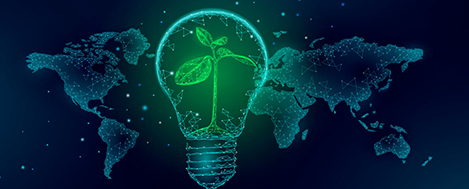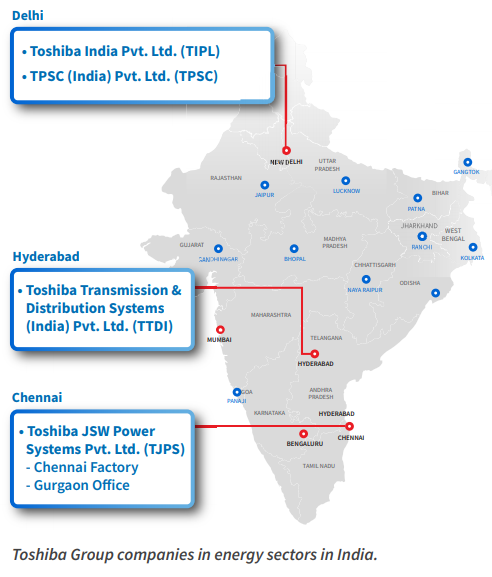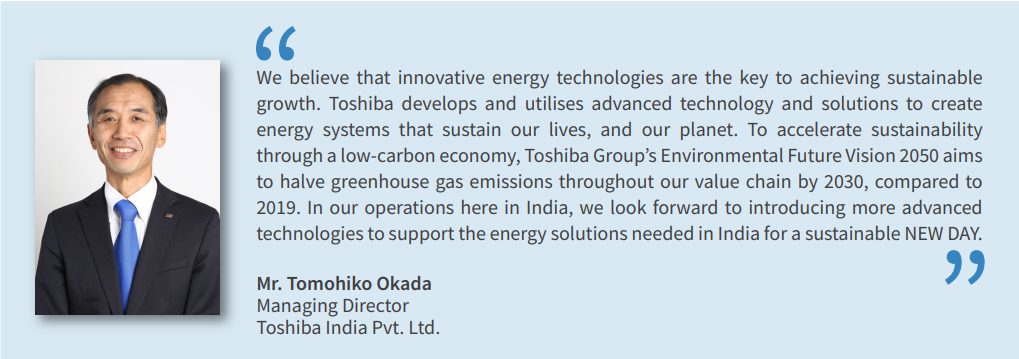
 Newsletter
Newsletter  TOSHIBA TIMES: (EM)Powering the future of energy
TOSHIBA TIMES: (EM)Powering the future of energy
TOSHIBA TIMES: (EM)Powering the future of energy

ISSUE 13: July 2021 – Rapid urbanization and
industrialization supplemented by an expanding economy, a growing
population, and improving quality of life has created enormous
energy demand in India. To achieve a high energy self-sufficiency
rate, India still largely depends on thermal-power. But
India’s Nationally Determined Contribution (NDC) ratified in
the Paris Agreement compels the government to encourage
alternative energy sources to reduce emissions against GDP by
33-35%, to below 2005 levels, by 2030. There is no doubt that
India’s future prosperity will depend on affordable, clean
and reliable energy sources that are environmentally friendly.
For over 50 years, Toshiba Group has been India’s strategic
partner in the energy sector, providing integrated solutions
ranging across power generation, transmission, distribution,
storage and management. The company’s global experience,
local manufacturing capabilities and emphasis on R&D into
technologies that contribute to carbon neutrality, have helped to
win an outstanding reputation in the market, and ensure that
Toshiba is well positioned to support India’s resolve to
achieve its NDC under the Paris Agreement.
Toshiba group companies in India providing green energy
solutions

Toshiba’s businesses in India offer technologies and
services for generating, transmitting and distributing energy for
the realization of a low carbon economy.
Our subsidiary, Toshiba JSW Power Systems (TJPS), implements
state-of-art technologies and processes in maintenance, renovation
& modernization of thermal plants, and in upgrading critical
turbine components to improve efficiency and reduce related
CO2-emissions. Toshiba’s advanced IoT technology will bring
new age digital solutions to power plants in India for minimizing
downtime and reducing environmental impacts.
Toshiba Transmission and Distribution Systems (India) Pvt. Ltd
(TTDI) designs, develops, and manufactures T&D products in
India supporting “Make in India” initiative of the
Government. As a leader in distribution transformers, TTDI has
supplied large number of solar inverter transformers in India, and
is fostering India’s transition towards renewable energy by
introducing many of its industry-first high capacity transformers
for renewables.
In Hydro Power Sector, Toshiba delivered both conventional and
pumped storage plants from small to large capacity machines. The
company has supplied and installed 24 hydroelectric turbines and
34 hydro generators to different reputed Indian plants where
machines have been operating smoothly. As India plans to add more
renewable energy into the grid, Toshiba’s adjustable speed
hydro pump storage system can provide smooth power supply to the
end consumer.
Looking to the future and beyond
As India begins the process of de-carbonising its economy, these
Toshiba technologies will play a key role in solving long-term
energy challenges, and regulating the ups and downs in supply from
renewable sources.
-
CO2 capture technology: efforts for CO2 emission reduction
Carbon dioxide Capture and Storage (CCS) is a range of
technologies to separate, capture, and sequester CO2
emissions from power plants and industrial sector, so that
it is not released to the atmosphere to contribute to
climate change. CCS is essential for the current transition
toward a low-carbon society.
Toshiba employs post combustion capture technology based on
a chemical absorption process, a technology that can be
applied flexibly to various flue gas streams, including but
not limited to thermal power plants. The company is now
accelerating development and deployment of the technology in
the market. In Japan, it has constructed the world's
first commercial- use Carbon dioxide capture and utilization
(CCU) plant in a municipal waste incineration plant in Saga
city in 2016. Toshiba also has started the operation of a
large-scale carbon capture facility at Mikawa Power Plant in
Omuta city in 2020, and the new facility is the world's
first Bio-energy power plant with a largescale Carbon
Capture and Storage (BECCS) capability.
-
Virtual power plant (VPP): a new solution today,
essential power infrastructure tomorrow
VPP contributes to the optimization of the supply and demand
balance in the power network by controlling multiple
distributed energy resources effectively, as a single
virtual power plant. It can maintain the stability of power
supply from renewable energy sources, such as solar and wind
power, which greatly depend on the weather to generate
power. VPP is expected to promote the introduction and
expansion of renewable energy and contribute to
decarbonization.
Toshiba is an industry leader in providing VPP solutions.
The company has been operating a demonstration project to
develop an intelligent VPP system for storage battery
control technology since 2016, and started an optimal
control of storage batteries using IoT technology for VPP
from January 2019. In 2020,
Toshiba set up a joint venture (JV) with Next Kraftwerke
GmbH, a German VPP operator, to use VPP technology to provide
services that support the balancing mechanism for renewable
energy assets owners and aggregators. Through the JV,
Toshiba is making firm progress
a renewable energy aggregation demonstration project, which it initiated this June.
Looking to the future, Toshiba is advancing VPP capabilities
by integrating AI into forecasting output from renewables,
and demand and market prices. The concept of energy service
comes as a solution to maintain the stability of the power
supply, which means scattered energy sources, such as
distributed power sources and storage batteries are remotely
controlled by IoT equipment and function.
-
Hydrogen energy: from water to water
Hydrogen energy is an important clean energy source.
Hydrogen can be stored indefinitely and transported over
long distances, and it produces no CO2 when
converted to electricity. Any roadmap to a low carbon
society recognizes the importance of hydrogen energy, and
Toshiba has long devoted resources to developing essential
technologies and systems. The company’s first launched
hydrogen system is the H2OneTM
Hydrogen-based Autonomous Energy Supply System.
H2OneTM is an integrated system that uses a
renewable energy source to electrolyze hydrogen from water,
and stores and uses the hydrogen in fuel cells to provide a
stable delivery of CO2-free,
environmentally-friendly electricity. It can be used even in
places where there is no power grid. Its green hydrogen
process is CO2-free throughout the entire cycle
of the production, storage, and use, and therefore
contributes to curbing global warming.
Click
here
to see more use cases of Toshiba’s Hydrogen
technology.



